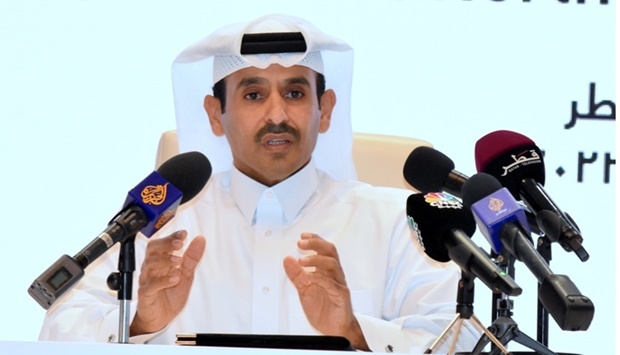QatarEnergy targets more than 11mn tonnes per year (mtpy) of carbon capture and storage (CCS) and the production of 5GW of solar power by 2035, HE the Minister of State for Energy Affairs Saad bin Sherida al-Kaabi said, highlighting Qatar’s commitment to CCS and renewable energy production.
“QatarEnergy is moving forward to help meet the growing global demand for cleaner energy, of which LNG is the backbone for a serious and realistic energy transition,” al-Kaabi said at a media event where QatarEnergy announced its selection of TotalEnergies as the first international partner in the multi-billion dollar North Field South (NFS) expansion project.
Al-Kaabi said: “We are committing big investments to lower the carbon intensity of our energy products, which constitute a key pillar of QatarEnergy’s sustainability and energy transition strategy.
“Furthermore, as you reported recently, we have announced the Ammonia-7 Project, the industry’s first world-scale and largest blue ammonia project with a capacity of 1.2 mtpy."
Blue ammonia is produced when the carbon dioxide generated during conventional ammonia production is captured and stored. It can be transported using conventional ships and then be used in power stations to produce low-carbon electricity.
The new plant, which is estimated to cost $1.156bn, will be located in the Mesaieed Industrial City (MIC) and will be operated by Qafco as part of its integrated facilities.
Last month, QatarEnergy’s affiliates, QatarEnergy Renewable Solutions (QRS) and Qatar Fertiliser Company (Qafco) signed the agreements for the construction of the Ammonia-7 project, the industry’s first world-scale as well as the largest blue ammonia train, which is expected to come into operation by the first quarter of 2026.
Al-Kaabi said QatarEnergy was always talking to buyers globally, whether in Europe or Asia, and would continue to do so for commercial contracts for the expansion project as per market needs.
“Uniper and RWE (German utilities) have a great relationship with us, we have been dealing with them for the last 20 years, we have contracts with some of them," al-Kaabi said.
"So, we are talking with both of them and there isn’t anything that I can say that is different from what I always say on commercial contracts, which is I don’t discuss them,” he added.
“QatarEnergy is moving forward to help meet the growing global demand for cleaner energy, of which LNG is the backbone for a serious and realistic energy transition,” al-Kaabi said at a media event where QatarEnergy announced its selection of TotalEnergies as the first international partner in the multi-billion dollar North Field South (NFS) expansion project.
Al-Kaabi said: “We are committing big investments to lower the carbon intensity of our energy products, which constitute a key pillar of QatarEnergy’s sustainability and energy transition strategy.
“Furthermore, as you reported recently, we have announced the Ammonia-7 Project, the industry’s first world-scale and largest blue ammonia project with a capacity of 1.2 mtpy."
Blue ammonia is produced when the carbon dioxide generated during conventional ammonia production is captured and stored. It can be transported using conventional ships and then be used in power stations to produce low-carbon electricity.
The new plant, which is estimated to cost $1.156bn, will be located in the Mesaieed Industrial City (MIC) and will be operated by Qafco as part of its integrated facilities.
Last month, QatarEnergy’s affiliates, QatarEnergy Renewable Solutions (QRS) and Qatar Fertiliser Company (Qafco) signed the agreements for the construction of the Ammonia-7 project, the industry’s first world-scale as well as the largest blue ammonia train, which is expected to come into operation by the first quarter of 2026.
Al-Kaabi said QatarEnergy was always talking to buyers globally, whether in Europe or Asia, and would continue to do so for commercial contracts for the expansion project as per market needs.
“Uniper and RWE (German utilities) have a great relationship with us, we have been dealing with them for the last 20 years, we have contracts with some of them," al-Kaabi said.
"So, we are talking with both of them and there isn’t anything that I can say that is different from what I always say on commercial contracts, which is I don’t discuss them,” he added.


